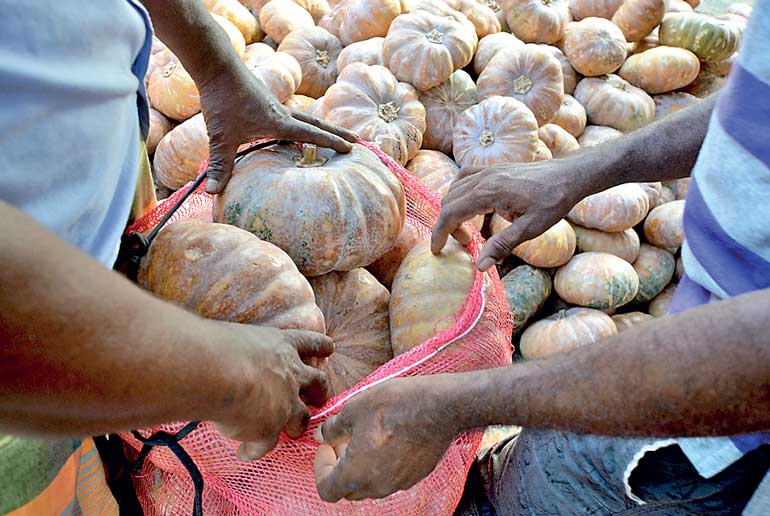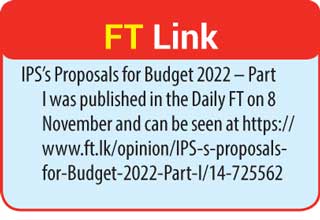Saturday Feb 14, 2026
Saturday Feb 14, 2026
Tuesday, 9 November 2021 01:03 - - {{hitsCtrl.values.hits}}

At present, the farming community is compelled to suffer massive losses during the harvesting season because of the seasonal glut in supply. Meanwhile, intermediaries and the other players in the high end of the value chain gain because they can control prices through controlling supply. This has implications on the food security of the country and the welfare of farmers – Pic by Shehan Gunasekara
 Food security
Food security
Ensuring national food security: National food security is not only a question of availability, but includes the other factors like food prices, food usage, and food supply stability. Hence, all these aspects influencing food security should be considered in policy formulation.
While the Government’s policy framework, ‘Vistas of Prosperity and Splendour’ (VPS) recognises the importance of introducing an agricultural crop management system, there is no proper mechanism to monitor how this will affect food usage, prices, and supply. At present, the farming community is compelled to suffer massive losses during the harvesting season because of the seasonal glut in supply. Meanwhile, intermediaries and the other players in the high end of the value chain gain because they can control prices through controlling supply. This has implications on the food security of the country and the welfare of farmers.
Recommendation: Establish an electronic-based monitoring system for the food systems so that domestic food production, imports, market prices, input availability etc., could be continuously monitored to ensure national food availability and household access to food. A regular monitoring system can safeguard the local food supply from international trade restrictions and possible malpractices by local traders.
Give priority to establish a holistic, coherent mechanism to ensure high-quality information is important. This information should be easily accessible across sectors for monitoring risks to food security. Such a system can provide valuable information for policy makers to take action to ensure food security. Big data tools such as satellites, telecommunication networks, sensors, drones, and smartphones have the potential to address the food system challenges by improving availability of information.
Developing e-commerce for food system resilience
As communities are increasingly dependent on markets for their food security and nutrition, properly functioning market chains and the uninterrupted flow of agricultural products are key elements within food systems. Shocks that disrupt market activities such as disasters and pandemics can cause considerable damage to households’ food availability, as well as their access to and utilisation of food.
VPS recognises the importance of introducing a new strategic plan for product marketing including systems of pre-contracts between producers and exporters. However, at present, the farming community is poorly connected with markets and intermediaries gain arbitrage opportunities while rural producers receive lower prices due to the lack of market information, poor infrastructure, weaker bargaining positions, and lengthy marketing channels.
Recommendations: IPS proposes to increase the capacity of e-commerce to minimise the problems in food supply chains and to ensure food system resilience. The increased demand for digital marketing platforms during the COVID-19 pandemic could be capitalised to promote the capacity of e-commerce at both ends of the food supply chain. For example: The Govipola Mobile App and the pilot project on Smart Agri Village were funded by EU. Such Information and Communication Technology (ICT) platforms, despite capacity concerns, have already proven useful to increase the resilience of the actors in the food system such as farmers, traders, and consumers.
Further, a mechanism needs to be developed to help connect smallholders to the e-commerce platform to prevent elite capture of the digital marketplace. In this regard, linking farmers’ cooperatives with the e-commerce platform or building Public-Private-Producer-Partnerships (4P) could be crucial. Public investments in developing an e-commerce-platform to create a digital marketplace to connect farmers and markets and to increase the availability of product and price information to buyers and sellers, to improve food availability, and food security while protecting farmer welfare is recommended.
Strengthening the regulatory and enforcement mechanism for organic fertiliser imports
The proposed ban on chemical fertiliser imports will be a significant shock to the agricultural systems of Sri Lanka and most likely will be untenable. Sri Lanka must revisit the import ban before it fails due to its implementation challenges creating massive disruption to the country’s agricultural sector. IPS research suggests that Sri Lanka can adopt a ‘sustainable intensification’ approach that anticipates a gradual reduction of the use of chemical inputs combined with good agroecological production practices, to increase organic fertiliser use overtime. Further to the ban, the government has decided to import organic fertilisers. Unlike inorganic fertilisers, which are inert materials, organic fertilisers are highly environment-specific live materials that could have irreversible environmental repercussions.
Therefore, the regulatory, implementation, and enforcement mechanism of the quality standards must be strengthened with immediate effect (with the coordination of relevant government institutions like National Plant Quarantine Service (NPQS); SLSI; Sri Lanka Atomic Energy Agency; ITI, etc.) to ensure that food ecosystems in the country are not adversely affected by introducing organic fertiliser.
Recommendations: Prudent application of a combination of instruments in place of the import ban on chemicals is needed such as tariffs on chemical fertiliser imports, tax concessions/subsidies for local production of organic fertiliser to promote the production and use of organic fertiliser. Along with this, the quality of chemical fertiliser imports needs to be regulated to safeguard local agriculture. Programmes to build awareness on efficient use of organic fertiliser can also help farmers with the shift to organic fertiliser use.
Tobacco taxes
Streamlining tobacco tax increases: IPS research shows that increasing tobacco taxes has the twin benefits of improving health as well as increasing government revenue. At a juncture when government finances are tight, policy solutions such as taxing tobacco can be leveraged to boost Government revenue without threatening economic growth. Increasing tobacco taxes in the forthcoming Budget could raise substantial amounts of additional revenue for the Government.
IPS estimates that the government could have earned nearly Rs. 20 billion in additional excise tax revenue from cigarettes in 2020, if cigarette taxes had been raised by 10% in line with inflation and streamlined to a uniform tax. This amounts to nearly 1.5% of total Government revenue in 2020. A similar revenue gain can be expected from a 10% increase in tobacco taxes this year.
Recommendation: Given that cigarette taxes have not been revised in nearly two years, since December 2019, the Government should use this opportunity to raise taxes, to attain the twin benefits of improved health and fiscal outcomes.
SMEs
Developing the creative and cultural industries: Much of Sri Lanka’s creative economy – which comprises traditional and modern cultural and creative industries – fall into the category of small and medium industries (SMIs). Lack of linkages to connect rural cultural and creative industry artisans with the relevant institutes and public services is an issue, despite programmes to support and encourage creative business activities conducted by different public institutions.
Lack of awareness, lack of coordination among various sectors of Government, and limited attention given to emerging cultural sectors – such as fashion designing, software, graphic designing, digital media – are some identified issues in this sector.
Recommendation: Streamlining Government programmes relating to creative and cultural programmes and build capacity in public institutions to provide efficient and effective services to artisans in creative industries. The outcomes of initiatives to develop the sector must be monitored and adjusted to improve effectiveness overtime. Special attention needs to be given by public institutions to fill the above-mentioned policy gaps. Proposed actions will attract rural youth into the sector, which will generate new employment opportunities and support the development of the rural sector.
Social protection
Repositioning social protection: The International Labour Organization (ILO) Social Security (Minimum Standards) Convention, 1952 (No. 102) (ILO C.102) specifies nine key branches of benefits that social security programmes are expected to deliver. These are: medical care, sickness, unemployment, old age benefit, employment injury, family benefit, maternity benefit, invalidity benefit, and survivor’s benefit. Although different social security schemes are available in Sri Lanka to provide some types of benefits under all nine schemes of ILO’s Social Security Convention (ILO C.102), their coverage is very low. Sri Lanka is also yet to ratify the minimum standard in social security as specified in the Convention.
Recommendations: Social security contributions in many countries are channelled to diverse funds for providing various types of social security benefits (i.e., maternity benefits, sickness benefits). Use a similar system to expand life-cycle social security to workers contributing to Employees’ Trust Fund (ETF). IPS calculations show that about 1.5% of the wage bill (or half of the ETF contributions) is sufficient to cover maternity benefits, sickness benefits, and unemployment benefits to meet the minimum requirements specified in ILO C.102 for those contributing to ETF. A further 0.2% of the total wage bill could cover wage support to firms to retain the workers who contribute to ETF in times of disaster.
Follow international best practices and optimise the use of ETF funds to provide wider benefits to its contributors. Such a scheme will enable workers to benefit from social security throughout their lifecycle and facilitate the ratification of the ILO C.102 of minimum social security standards. Greater life-cycle benefits will encourage more workers to contribute to ETF. This will have minimum impact on the budget as allocations for the most part will be from the ETF fund. Such a change in focus should be done in concurrence with different stakeholders to maintain transparency and trust.
(Read IPS’s Budget 2022 Proposals in full at https://www.ips.lk/ips-proposals-for-budget-2022/.)